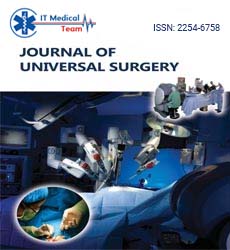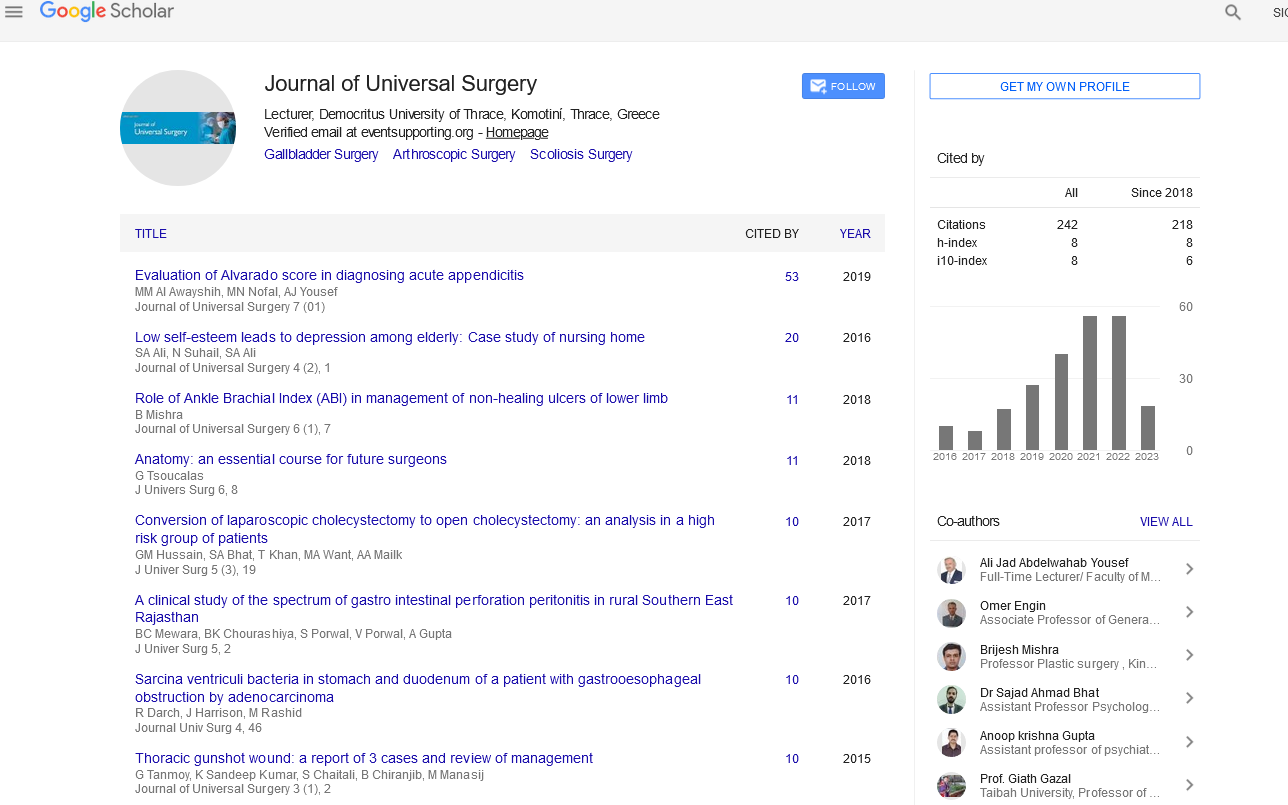Research Article - (2022) Volume 10, Issue 1
Pre operative Serum Albumin and Body Mass Index as Predictors of Post operative Morbidity and mortality in Major Open Abdominal Surgeries
Aneez Sadhik*
Department of Universal Surgery, University of Delhi, India
*Correspondence:
Aneez Sadhik, Department of Universal Surgery,
University of Delhi,
India,
Tel: 8281232141,
Email:
Received: 18-Feb-2022, Manuscript No. IPJUS-22-11574;
Editor assigned: 21-Feb-2022, Pre QC No. IPJUS-22-11574(PQ);
Reviewed: 07-Mar-2022, QC No. IPJUS-22-11574;
Revised: 11-Mar-2022, Manuscript No. IPJUS-22-11574(R);
Published:
18-Mar-2022, DOI: 10.36648/2254-6758.22.10.1
Abstract
Background: Healing is a catabolic process needing energy.
Any malnutrition leads to impaired wound healing. Some of
the markers of the nutritional status of the body that are
routinely used are the BMI and the levels of serum albumin
of the patients. In the current study we evaluated the role
of serum albumin and Body Mass Index as predictors of
postoperative morbidity and mortality both in elective and
emergency major surgeries.
Aims and objectives: To determine the role of low serum
albumin and abnormal BMI and to observe those
developing any morbidity and mortality post operatively.
Materials and methods: The study evaluated a total of 82
patients and undergoing major abdominal surgeries. Those
pregnant, having significant co-morbidities were excluded.
Pre-operative serum albumin measurements were done,
BMI was calculated and post-operative morbidity &
mortality were recorded. The data was compiled and
standard statistical tests applied to analyze the data.
Results: The study was male preponderant with 53 males
and 29 females. Mean duration of stay in ICU and ward in
those with normal albumin levels was 2.158 days and 8.68
days respectively compared to 4.984 days and 11.06 days in
the hypoalbuminemia. There were higher complications in
the post-operative period in those patients with
hypoalbuminemia and abnormal BMI.
Conclusion: Pre-operative Serum albumin and BMI are
significant predictors of post-operative morbidity.
Keywords
Serum albumin; BMI Major abdominal operation
s; Post-operative morbidity
INTRODUCTION
The process of wound healing is a catabolic process which for
its completion consumes energy [1,2]. Having said that the
patients who present with various abdominal conditions
necessitating surgery are most often in a state of catabolism owing to inadequate intake as a result of various reasons like
nausea, vomiting or loss of nutrients as a result of diarrhoea
[3-5].
Patients who are severely malnourished demonstrate
impaired wound healing and predisposition to infection, usually
as a result of abnormality or deficiency of the various immune
mechanisms that act as a defense mechanism [6-8]. Some of the
markers of the nutritional status of the body that are routinely
used are the BMI and the levels of serum albumin of the
patients [9-13]. BMI and the serum levels of albumin when
deranged may potentially result in surgical complication.
In the current study we evaluated the role of serum albumin
and Body Mass Index as predictors of postoperative morbidity
and mortality both in elective and emergency major surgeries.
Materials and Methods
The current study evaluated a total of 82 patients who
underwent major abdominal surgeries under the Department of
General Surgery, in a tertiary referral hospital in South India. In
this Descriptive Analytical Observational Study, the patients
were selected by simple random sampling. Informed
consent was obtained from all the participants.
All major surgeries involving opening the abdominal cavity,
elective surgery as well as emergency cases, both male and
females patients older than 18 years of age were included in
study. Pregnant women, those on immunosuppressive drugs
and who had chronic disease such as chronic liver disease,
chronic kidney disease was excluded from the study. Preoperative
serum albumin measurements were done, and
BMI was calculated. Data was compiled and standard
statistical tests applied to analyse the data.
The comparison was done after segregating the patients in to
those with normal albumin levels vs. those with
hypoalbuminemia and those with normal BMI vs. those with
abnormal BMI (Tables 1-3).
Results
| ICU days |
Normal albumin levels |
Hypoalbuminemia |
P value |
| Mean |
2.158 days |
4.984 |
0.002 |
| Mode |
1 days |
|
1.0 days |
| Std. Deviation |
0.9416 days |
|
1.3336 days |
| Variance |
9.251 days |
|
11.113 days |
| Minimum |
1 days |
|
1 days |
| Maximum |
4 days |
|
19 days |
Table 1: Duration of ICU stay.
| Duration of ward stay |
Normal albumin levels |
Hypoalbuminemia |
P value |
| Mean |
8.684 |
11.063 |
0.049 |
| Median |
4 |
9 |
|
| Mode |
2 |
2 |
|
| Std. Deviation |
3.6035 |
4.4132 |
|
| Minimum |
3 |
3 |
|
| Maximum |
12 |
39 |
|
Table 2: Duration of Ward stay.
| Age |
Normal albumin |
Low albumin |
P value |
| Mean |
46.93 |
41.53 |
0.08 |
| Sd |
12.92 |
16.92 |
|
| Bmi |
Mean age |
SD |
|
| Less than 18.5 kg/m2 |
47.09 |
18.85 |
|
| 18.5 - 25 kg/m2 |
42.76 |
14.5 |
|
| 25.1-30 kg/m2 |
45.83 |
20.06 |
|
| More than 30 kg/m2 |
46 |
16.78 |
|
Table 3: Age evaluation.
Discussion
We noted that with the decrease in albumin levels, the postoperative complications increased and there was a negative co relation between serum albumin and complications. Serum albumin levels of less than 3.5 g/dl had a higher association with post-operative morbidity according to the study [14,15,16]. In the present study we noted similar findings in those patients who have a low serum albumin level lesser than 3.5 g/dl they have a higher rate of complications in the form of lower respiratory tract and urinary tract infections when compared with patients having normal albumin levels. Evaluated the relationship between the BMI levels and the morbidity observed 40% patients who had complications had mean BMI value of 21.44 kg/m2 respectively and 60% patients who had no complications had a mean BMI value 20.30 kg/m2 p<0.05. [18] Observed that in 45.5% of hypoalbuminemia cases had complications as compared to 5.5% with normal albumin levels. Chest infections, (25% versus 6%), Mortality of 14 (18% versus 3%), Skin and soft tissue infections were observed in (28 cases versus 5 (15%) (Figures 1-3).
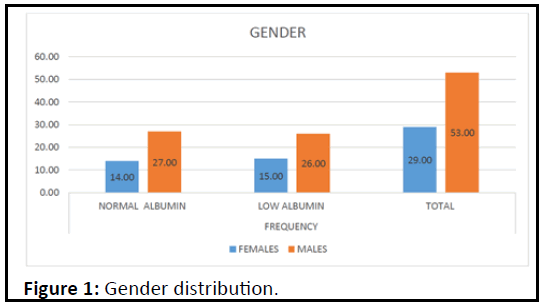
Figure 1: Gender distribution.
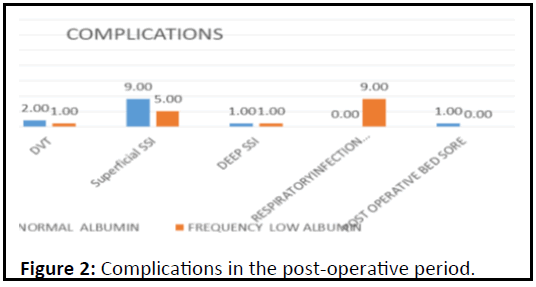
Figure 2: Complications in the post-operative period.
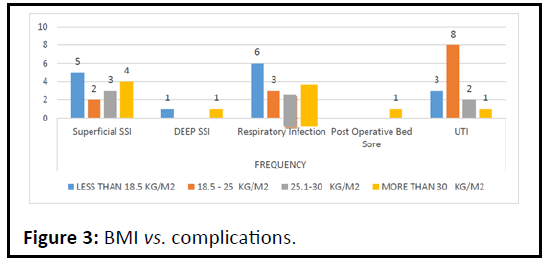
Figure 3: BMI vs. complications.
In the present study there was significant difference in the complications in the post-operative period, between the two groups. Respiratory Infection was noted in 9 cases (10.97%) of those patients with low albumin levels. UTI was seen higher in those with low albumin i.e., 13 cases and one case of UTI with normal albumin. (92.85% in the low albumin and 7.1% in the high p<0.0001). We noted similar findings in those patients who have a abnormal BMI have a higher rate of complications in the form of SSI and respiratory tract infections (Figure 4).
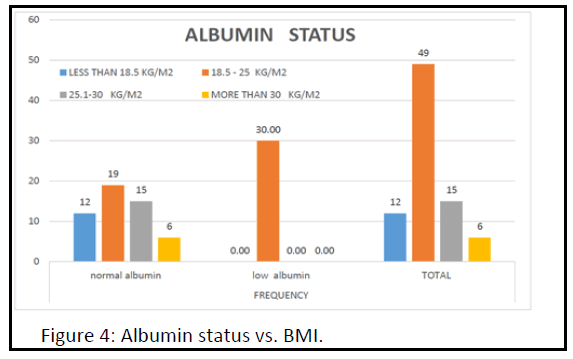
Figure 4: Albumin status vs. BMI.
Limitations of our study included a smaller sample size that cannot be extrapolated to regional and national level trends. A long term follow up was not performed and the effect of correcting albumin & BMI levels prior to surgery was not estimated.
Conclusion
Based on findings o f o ur study following points can be
concluded:
• Low albumin and abnormal BMI are associated with higher
duration of stay in ICU and ward in patients undergoing major
abdominal surgeries.
• Low albumin and abnormal BMI are associated with higher
risk of complications in post-operative period in patients
undergoing major abdominal surgeries.
• Low albumin and abnormal BMI are to be considered as
reliable factors for predicting post-operative morbidity in
patients undergoing major abdominal surgeries.
References
- Demling RH (2009) Nutrition, anabolism, and the wound healing process: an overview. Eplasty 9:18
[Google Scholar] [Pubmed]
- John MacFie. Nutrition and Fluid Therapy. Bailey and Love, Short Practice of Surgery 223-225
- O'Keefe SJ, Sender PM, James WP (1974) Catabolic loss of body nitrogen in response to surgery. The Lancet 304:1035-1038
[Crossreff] [Google Scholar] [Pubmed]
- Wray CJ, Mammen JM, Hasselgren PO (2002) Catabolic response to stress and potential benefits of nutrition support. Nutrition 18:971-917
[Crossreff] [Google Scholar] [Pubmed]
- Burnham WR (1982) Nutritional support of patients with gastrointestinal disease. Br J Clin Pharmacol 14:315
[Crossreff] [Google Scholar] [Pubmed]
- Haydock DA, Hill GL (1986) Impaired wound healing in surgical patients with varying degrees of malnutrition. JPEN J Parenter Enteral 10:550-554
[Crossreff] [Google Scholar] [Pubmed]
- Norman K, Pichard C, Lochs H, Pirlich M (2008) Prognostic impact of disease-related malnutrition. Clinical nutrition 27:5-15
[Crossreff] [Google Scholar]
- Badac VJ, Stephen F. Lowry Systemic response to injury and metabolic support; 9th edition, Shwartz Principles of Surgery 10:36-42
- Stotts NA (2015) Nutritional assessment and support. Acute and Chronic Wounds-E-Book 7:408
- Cheng HQ (2010) Preoperative evaluation and perioperative management. Curr Med Diag Treat 53-54
- Engelman DT, Adams DH, Byrne JG, Aranki SF, Collins Jr JJ, et al. (1999) Impact of body mass index and albumin on morbidity and mortality after cardiac surgery. J Thorac Cardiovasc Surg 118:866-873
- Rapp-Kesek D, Ståhle E, Karlsson T (2004) Body mass index and albumin in the preoperative evaluation of cardiac surgery patients. Clin nutr 23:1398-1404
[Crossreff] [Google Scholar] [Pubmed]
- Sungurtekin H, Sungurtekin U, Balci C, Zencir M, Erdem E, et al. (2004) The influence of nutritional status on complications after major intraabdominal surgery. J Am Coll Nutr 23:227-332
[Crossreff] [Google Scholar] [Pubmed]
- Mullen JT, Davenport DL, Hutter MM, Hosokawa PW, et al. (2008) Impact of body mass index on perioperative outcomes in patients undergoing major intra-abdominal cancer surgery. Ann Surg Oncol 15:2164
- Gibbs J, Cull W, Henderson W. Daley J, Hur K, et al. (1999) Preoperative serum albumin level as a predictor of operative mortality and morbidity. Arch Surg 134:36-42
[Crossreff] [Google Scholar] [Pubmed]
- Leite HP, da Silva AV, de Oliveira Iglesias SB, Nogueira PC (2016) Serum albumin is an independent predictor of clinical outcomes in critically ill children. Pediatr Crit Care Med 17:50-57
- Bhagvat VM, Ghetla S, Shetty T, Upwanshi M (2016) Role of serum albumin and body mass index as predictors of post-operative morbidity and mortality in elective major abdominal surgeries. Int Surg J 4:91-96
- Bhuyan K, Das S (2016) Preoperative serum albumin level as independent predictor of surgical outcome in acute abdomen. Int Surg J 3:277-279
[Crossreff] [Google Scholar]
Citation: Aneez Sadhik (2022) Pre-operative Serum Albumin and Body Mass Index as Predictors of Post-Operative Morbidity and Mortality in
Major Open Abdominal Surgeries. J Univer Surg Vol:10 No: 1
